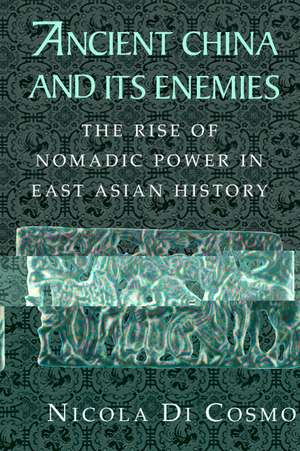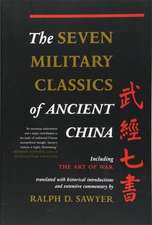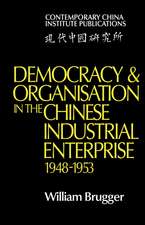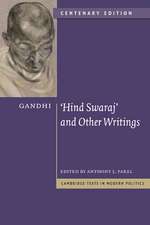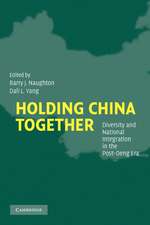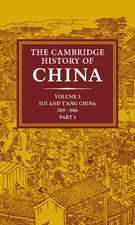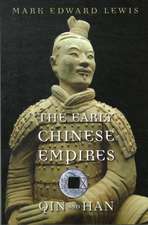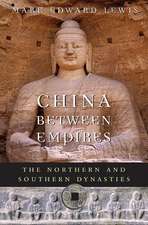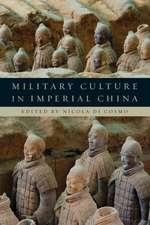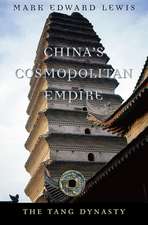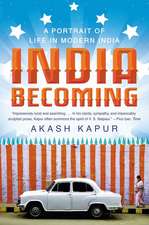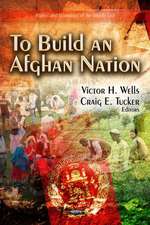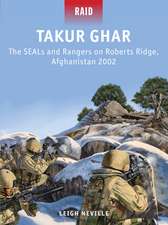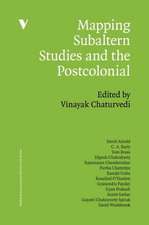Ancient China and its Enemies: The Rise of Nomadic Power in East Asian History
Autor Nicola Di Cosmoen Limba Engleză Paperback – 21 apr 2004
| Toate formatele și edițiile | Preț | Express |
|---|---|---|
| Paperback (1) | 226.73 lei 3-5 săpt. | |
| Cambridge University Press – 21 apr 2004 | 226.73 lei 3-5 săpt. | |
| Hardback (1) | 756.20 lei 6-8 săpt. | |
| Cambridge University Press – 24 feb 2002 | 756.20 lei 6-8 săpt. |
Preț: 226.73 lei
Nou
Puncte Express: 340
Preț estimativ în valută:
43.39€ • 45.13$ • 35.82£
43.39€ • 45.13$ • 35.82£
Carte disponibilă
Livrare economică 22 martie-05 aprilie
Preluare comenzi: 021 569.72.76
Specificații
ISBN-13: 9780521543828
ISBN-10: 0521543827
Pagini: 380
Dimensiuni: 152 x 229 x 21 mm
Greutate: 0.5 kg
Ediția:Pbk.
Editura: Cambridge University Press
Colecția Cambridge University Press
Locul publicării:New York, United States
ISBN-10: 0521543827
Pagini: 380
Dimensiuni: 152 x 229 x 21 mm
Greutate: 0.5 kg
Ediția:Pbk.
Editura: Cambridge University Press
Colecția Cambridge University Press
Locul publicării:New York, United States
Cuprins
Introduction; Part I: 1. The Steppe Highway: the rise of pastoral nomadism as a Eurasian phenomenon; 2. Bronze, iron and gold: the evolution of nomadic cultures on the northern frontier of China; Part II: 3. Beasts and birds: the historical context of early Chinese perceptions of northern peoples; 4. Walls and horses: the beginning of historical contacts between horse-riding Nomads and Chinese states; Part III: 5. Those who draw the bow: the rise of the Hsiung-nu Nomadic Empire and the political unification of the Nomads; 6. From peace to war: China's shift from appeasement to military engagement; Part IV: 7. In search of grass and water: ethnography and history of the North in the Historian's Records; 8. Taming the North: the rationalization of the nomads in Ssu-ma Ch'ien's historical thought; Conclusion.
Recenzii
'This very substantial book is a work of great historical importance. Nicola Di Cosmo has a remarkable grasp of all aspects of the northern border world in the first millennium B.C. Written in a remarkably orderly and lucid way, Ancient China and Its Enemies is readily accessible not only to a specialist Chinese historian, but to any scholar interested in the relationships between the Chinese state and its northern neighbors in later times. This is a fine book, from which I have learned a great deal, and which has made me question some of my own ideas.' Denis Twitchett, Princeton University
'Throughout the second century B.C., the world of East Asia was divided between two great superpowers, the Han Chinese and the Hsiung-nu, facing off against each other sometimes peaceably and sometimes antagonistically. In Ancient China and Its Enemies, Nicola Di Cosmo provides a magisterial survey of the rise of the lesser known of these two powers, the nomadic Hsiung-nu. This book is invaluable not only for understanding the relations between ancient China and its major enemy, but also for understanding either of the powers individually.' Edward Shaughnessy, University of Chicago
'… combines the clarity and comprehensiveness of a textbook with the novelty and originality of the specialist-oriented study.' Yuri Pines, Institute of Historical Research Web Reviews
'… this is an important work and a valuable contribution to the field, which should be read by anyone interested in the history of Chinese-nomadic interactions. Di Cosmo's scholarship is firs-rate, and his mastery of a dizzying array of sources in Chinese and a number of European languages is impressive.' The Journal of Asian Studies
'… does an excellent job of synthesizing known facts drawn from archaeology and geography with various theories on the emergence of nomadic steppe culture. Particularly valuable is the extensive use of Chinese-language archaeological reports, and the map on pp.60-61 is an excellent aid … This is an excellent book packed with information and insightful analysis'. Journal of Social Anthropology
'Throughout the second century B.C., the world of East Asia was divided between two great superpowers, the Han Chinese and the Hsiung-nu, facing off against each other sometimes peaceably and sometimes antagonistically. In Ancient China and Its Enemies, Nicola Di Cosmo provides a magisterial survey of the rise of the lesser known of these two powers, the nomadic Hsiung-nu. This book is invaluable not only for understanding the relations between ancient China and its major enemy, but also for understanding either of the powers individually.' Edward Shaughnessy, University of Chicago
'… combines the clarity and comprehensiveness of a textbook with the novelty and originality of the specialist-oriented study.' Yuri Pines, Institute of Historical Research Web Reviews
'… this is an important work and a valuable contribution to the field, which should be read by anyone interested in the history of Chinese-nomadic interactions. Di Cosmo's scholarship is firs-rate, and his mastery of a dizzying array of sources in Chinese and a number of European languages is impressive.' The Journal of Asian Studies
'… does an excellent job of synthesizing known facts drawn from archaeology and geography with various theories on the emergence of nomadic steppe culture. Particularly valuable is the extensive use of Chinese-language archaeological reports, and the map on pp.60-61 is an excellent aid … This is an excellent book packed with information and insightful analysis'. Journal of Social Anthropology
Notă biografică
Descriere
This 2002 book investigates the origins of the antagonism between early China and its 'barbarian' northern neighbours.
